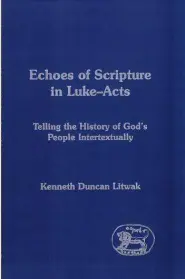

Echoes Of Scripture In Luke-acts: Telling The History Of God's People Intertextually (Journal for the Study of the New Testament Supplem)
Pages
234
Publisher
T&T Clark
Published
2005
ISBN-13
9780567030252
Litwak challenges previous studies of the use of the Old Testament in Luke-Acts as inadequate. In contrast to previous studies that consider only quotations or obvious allusions, he examines intertextual echoes of the Old Testament at strategic points in Luke-Acts, as well as quotations and allusions and echoed traditions. Thus, this study's database is larger. Previous studies generally argue that Luke's use of the Scriptures is in the service of christology. This leads to the exclusion of scriptural citations, such as those of the temptation (Luke 4.1-13) which have different emphases. Litwak views ecclesiology as the overall purpose behind Luke's use of the Old Testament, but he does not skip or avoid intertextual references that may lie outside an ecclesiological function. Whilst other studies contend that Luke uses the Old Testament according to a promise-fulfillment/proof-form-prophecy hermeneutic, Litwak argues that this fails to account for many of the intertextual references. Other studies often subsume all of Luke's use of the Scriptures of Israel under one theme, such as the 'New Exodus', but this study does not require that every intertextual echo maps to a specific theme. Rather, the many intertextual references in strategic texts at the beginning, middle and end of Luke-Acts, and Luke's use of the texts, are allowed to dictate the 'themes' to which they relate. This is Volume 282 in the Journal for the Study of New Testament Supplement series.
Reviews
Echoes of Scripture in Luke-Acts: Telling the History of God�s People Intertextually Journal for the Study of the New Testament Supplement Series 282 London: T&T Clark, 2005. Pp. x + 234. Hardcover. $130.00. ISBN 0567030253. Bart J. Koet Catholic Theological University Utrecht Utrecht, The Netherlands 3508 TC It is well known that Michelangelo made the ceiling of the famous Sistine Chapel for Pope Julius II. Maybe it is less known that a generation earlier Pope Sixtus IV, who was also a (patristic) scholar, asked the famous painters of his time (e.g., Perugino, Pinturicchio, Rosselli, Botticelli, and Signorelli) to make twelve great compositions for the same chapel: at one side there are six dedicated to events of Moses� life; at the other, six dedicated to Jesus� life. These pictures exemplify a long tradition. In the churches of the fourth, fifth, and sixth centuries, the walls were often decorated with what was called sacrae historiae, holy stories. On the walls there were mosaics of important stories from the Old Testament and from the New: these stories belonged together and were meant to show that there was a continuity between the Testaments (e.g., in the Santa Maria Maggiore, there were scenes from Genesis, Exodus, Joshua, and the New Testament). That there is a continuity between the Old Testament, or the Scriptures of Israel, and one of the largest parts of the New Testament, Luke-Acts, is one of the central messages of the book under review. From the beginning it is clear that Litwak presents his study as different. He stresses that other scholars often reduce Luke�s use of the Scriptures of Israel to a relatively small number of isolated phenomena but that he will show that these Scriptures pervade Luke-Acts from its beginning to its end: Scriptures play a hermeneutical role in shaping Luke-Acts. In the first chapter he defines basic terminology, reviews previous research, and presents the aim of his study. Because Luke could not have used the designation �Old Testament� (or �First Testament�), Litwak proposes to label this collection of books �Scriptures of Israel.� Litwak focuses on the way in whic h Luke shaped or �framed� his account.
[Full Review]
